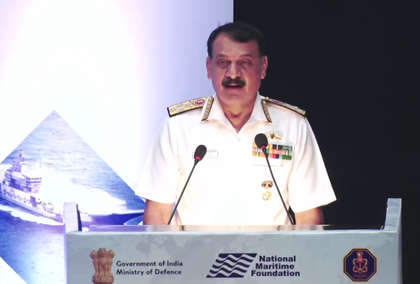Indian Navy chief calls for collective maritime strategy in 'complex' Indo-Pacific region
By IANS | Updated: October 28, 2025 15:15 IST2025-10-28T15:13:53+5:302025-10-28T15:15:12+5:30
New Delhi, Oct 28 Indian Navy chief, Admiral Dinesh K. Tripathi, on Tuesday, emphasised the need for collective, ...

Indian Navy chief calls for collective maritime strategy in 'complex' Indo-Pacific region
New Delhi, Oct 28 Indian Navy chief, Admiral Dinesh K. Tripathi, on Tuesday, emphasised the need for collective, cooperative and technology-driven approaches to ensure maritime security in an increasingly complex Indo-Pacific, as he inaugurated the 11th edition of the Indo-Pacific Regional Dialogue (IPRD) here.
Welcoming over 30 international delegates, Admiral Tripathi said the Indo-Pacific’s future "must be shaped together, through dialogue, cooperation and mutual trust".
This year’s theme, he noted, reflects India’s expanded maritime vision — from SAGAR (Security and Growth for All in the Region) to MAHASAGAR (Mutual and Holistic Advancement for Security and Growth Across Regions) — underscoring India’s commitment to a secure and inclusive maritime order.
Highlighting what he termed the "dynaxity" of the maritime environment — a blend of dynamism and complexity — Admiral Tripathi identified three defining currents: commercial disruption, transnational turbulence, and technological acceleration.
"Global seaborne trade growth is projected to drop to 0.5 per cent in 2025 from 2.2 per cent in 2024, signalling strategic fragility," he said, citing the Red Sea crisis as a reminder of how chokepoints can destabilise global supply chains.
"The Red Sea crisis has demonstrated how a single maritime chokepoint can ripple across global freight indices, insurance premiums, and food prices," he said.
He also warned against rising illegal fishing, trafficking, and maritime pollution, which threaten livelihoods, particularly in Small Island Developing States.
"According to the UN Food and Agriculture Organisation (FAO), IUU fishing activities are responsible for the loss of 11 to 26 million tonnes of fish each year, which is estimated to have an economic value of $10 to 23 billion," he said.
"At the same time, smuggling networks are increasingly exploiting ungoverned maritime spaces and weak enforcement regimes to move narcotics, arms, and even sanctioned commodities, for financing terror networks and fuelling instability ashore," he noted, adding: "Rising sea levels, extreme weather and marine pollution have added new dimension to transnational maritime challenges, threatening both lives and livelihoods, especially for Small Island Developing States (SIDS)."
On technology, he noted that while AI, autonomous systems and satellites are enhancing maritime awareness, they also expose vulnerabilities such as GPS jamming and cyber intrusions.
Admiral Tripathi outlined three pillars to navigate maritime "dynaxity": holistic maritime security, capacity building, and capability enhancement.
He highlighted the Indian Navy’s initiatives, including the Information Fusion Centre–Indian Ocean Region (IFC-IOR) in Gurugram, which currently hosts 15 international liaison officers and aims to expand to 50 by 2028.
He also cited India’s collaborative exercises like AIKEYME with African nations and Pacific Reach, as well as innovations such as the indigenous NISHAR-MITRA terminals for secure communication.
"India’s own experience underscores that capacity building cannot be an insular enterprise. It thrives on partnerships, through joint design, co-production, maintenance collaboration, and mutual support in crisis response," he said.
"Under MAHASAGAR, India’s defence-industrial transformation seeks to extend such cooperation beyond our shores, enabling friends and partners to strengthen their maritime presence with indigenous design, affordable technologies, and sustainable support systems. True capacity, after all, is not what a nation accumulates, but what a region aggregates."
Disclaimer: This post has been auto-published from an agency feed without any modifications to the text and has not been reviewed by an editor
Open in app